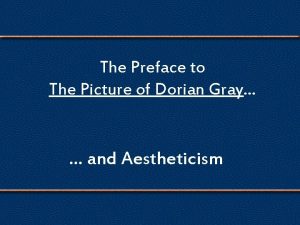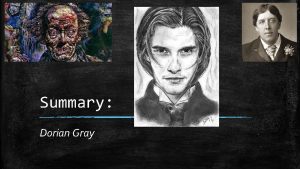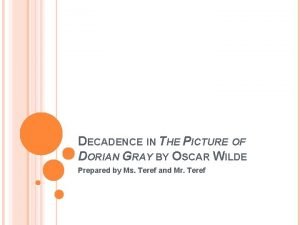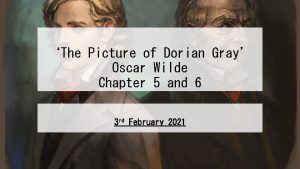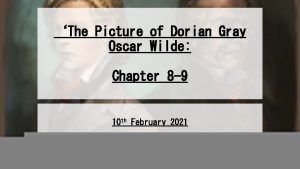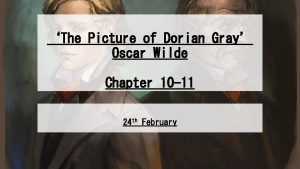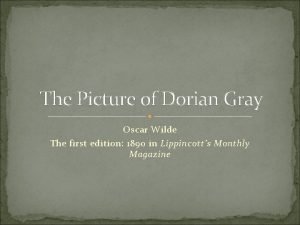The Picture of Dorian Gray Oscar Wilde Chapter







- Slides: 7

‘The Picture of Dorian Gray’ Oscar Wilde Chapter 12 -13 3 rd March 2021

Objectives • Consider the significance of time • Explore Dorian’s decadence/transformation • Understand Gothic elements of the text

Homework – Chapter 11 Answer the following: 1. How do we see the degeneration of Dorian’s character? 2. List three things Dorian collects. 3. How does Dorian treat religious artifacts/materials? 4. How do women in society react to Dorian? 5. Why does Wilde include a chapter like this?

Chapter 12 Read the chapter independently. Make notes on: • Dorian’s decadence and transformation • The regression of Dorian’s and Basil’s relationship • Passing of time Read the analysis here: https: //www. sparknotes. com/lit/doriangray/section 6/

Starter – Chapter 13 Read together and make notes.

Written Response Produce an analysis of the extract outlined on the Word document. Q – Explore how this extract is typical of Gothic Literature. Your response should focus on the extract, as the priority. Use terminology to analyse closely. You can make links to other texts, and other parts of this text when appropriate. But they should be concise, and used to expand a point you are already making.

Exemplar Dorian’s immediate questioning of Basil’s faith positions Dorian as the extract’s antagonist, consequently placing Basil in a position of subservience. Dorian seemingly enjoys the revelation of his ‘soul’ as he ‘tore the curtain from its rod and flung it to the ground’. Wilde’s language is purposefully dynamic through the verb ‘tore’ introducing a masochistic element to Dorian’s nature, as he ‘spectates’ his close friend observing the true nature of his soul for the first time. Such revelations are typical in Gothic Literature, as they provoke shock and terror within the reader often introducing a discussion of human nature, and the battle between forces of good and evil. In Angela Carter’s ‘The Bloody Chamber’, the narrator only truly knows her husband, the Marquis, upon the discovery of the chamber itself. Therefore, through the ‘chamber’ and the ‘portrait’ both authors use a vehicle to expose the true nature of the human soul, and man’s ability to hide such macabre secrets from society. This idea is further expounded through Basil’s statement ‘You are mad Dorian, or playing a part’ whereby the true nature of Dorian is initially rejected by Basil until he sees the portrait for himself. Wilde’s effeminate portrayal of Basil’s response as ‘an exclamation of horror broke from his lips’ heightens Dorian’s control of the situation which he uses throughout the extract to manipulate both Basil and the reader alike. Wilde suggests that it is impossible to know somebody’s true nature unless we are able to view their soul, which is a direct criticism of Western society.


